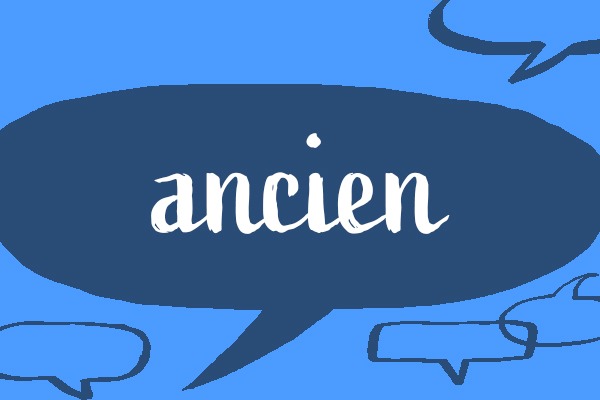Our French word of the week is ancien.
Ancien is an adjective. Its feminine form is ancienne. You’ll also see its two plural forms – anciens and anciennes. You can find its pronunciation here:
function playAudio(url) { new Audio(url).play(); }From the way it sounds and the way we spell it, you might think it’s the same as the English word, ancient. But be careful when translating it in this way: ancien can be a false friend depending on the context. It’s important to think about context when trying to understand the meaning of a word in French. To help you a bit, you can work out the meaning by looking at where ancien sits in a sentence.
The most common meaning is former or old, as in previous or no longer. When this is the case, the adjective normally comes before the noun:
C’est mon ancienne maision. That’s my old house.
l’ancien président de la France the former president of France
J’ai rencontré mes anciens collègues au café. I met my former colleagues at the café.
However, just like you might have assumed at first, ancien can also mean ancient or antique. When this is the case, the adjective normally comes after the noun:
un fauteuil ancien an antique armchair
aux temps anciens in ancient times
le grec ancien ancient Greek
In the context of French cuisine, the feminine form of this word is used to mean something even more specific. When reading recipes or dishes on a menu, you might see the phrase à l’ancienne after a noun. This doesn’t mean the food is ancient or old – it means that the dish is made in the traditional way. We might also call this old-fashioned in English:
chocolat chaud à l’ancienne (hot chocolate)
boeuf bourguignon à l’ancienne (beef Bourguignon, a classic French stew)
tomates farcies à l’ancienne (stuffed tomatoes)
The next time you come across this term in French, think about the context of the sentence, as well as the position of the adjective, to work out its meaning. Soon, you won’t need to think too much about what the word is supposed to mean – it’ll be ancient history to you!
You can find out more about the way word order can affect the meanings of French adjectives on our Easy Learning Grammar pages.
Come back next week to find out more facts about another French word of the week.
Written by Holly Tarbet, freelance copywriter and editor.
All opinions expressed on this blog are those of the individual writers, and do not necessarily reflect the opinions or policies of Collins, or its parent company, HarperCollins.



